Book of the Day Roundup April 23-April 27

House of Rougeaux
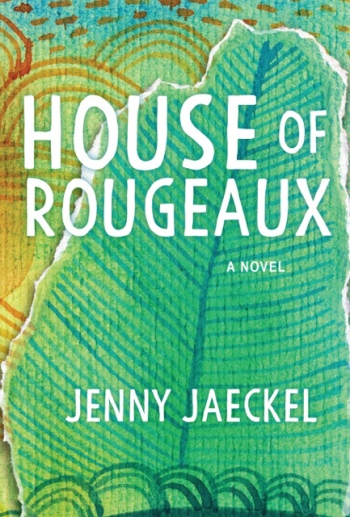
Jenny Jaeckel
Raincloud Press
Hardcover $26.95 (308pp)
978-1-941203-24-8
Buy: Amazon
On a Martinique sugar plantation near the end of the eighteenth century, sister and brother Abeje and Adunbi are the first generation born into slavery. They are orphaned at an early age. Abeje grows into a healing woman with an instinct for natural remedies and a gift of second sight, while Adunbi is valued for his building skills. Though Abeje never has children of her own, hers is the spirit that echoes through Adunbi’s descendants as the book moves across six generations.
The story unfolds in seven sections, each focusing on a different member of what becomes a very large clan. To the book’s credit, this is not your typical generational tale. The sections are not presented in chronological order, but skip from Abeje to the 1950s and civil rights eras, then back again to the last decades of slavery, then forward to post-Civil War years. Also unconventional is the fact that the story does not pass from parent to child, but broadens to hopscotch among characters who are distant cousins.
Both of these high-wire risks work to the book’s advantage, creating a wide tapestry rather than a narrow portrait and giving a sense of the vast scope that the word “family” entails.
Fine brushstrokes bring the writing to life, capturing the scent of woodsmoke and sun-dried grass, or a box of rose candies that symbolizes choice. Occasionally, this penchant for literary flair overtakes clarity, rendering events vague or confusing, as when the opening pages make an eighty-year leap without explanation or demarcation. At its best, though, the book achieves a resonance that lingers long after its plot points are forgotten.
Perhaps the greatest achievement of the book is that in spite of the inescapable presence of slavery and prejudice, it isn’t really about either of these. Jenny Jaeckel’s House of Rougeaux is about people—varied and fully realized individuals who make a flawed world their own.
SUSAN WAGGONER (February 27, 2018)
Theory of Bastards
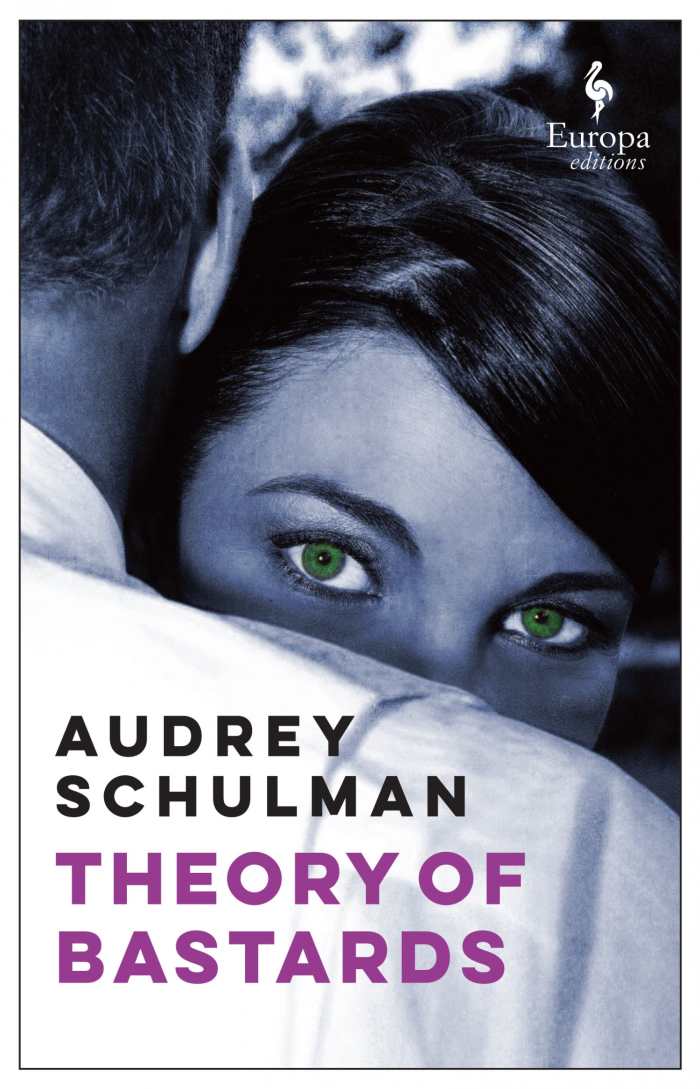
Audrey Schulman
Europa Editions
Softcover $18.00 (416pp)
978-1-60945-437-1
Buy: Local Bookstore (Bookshop), Amazon
Audrey Schulman’s engrossing novel is a combination of dystopian fiction, science fiction, and a love story, uniting bonobos and survival in the not-so-distant future.
Dr. Francine Burk, a recent MacArthur winner, has decided to share her award with The Foundation, which houses orangutans, chimps, and bonobos for animal research. Burk decides to study the mating rituals of the bonobos, among whom there is almost no violence. She chooses a researcher, David Stotts, to help her with her study.
Endometriosis also takes the stage through Burk, who has suffered a severe case for years at the novel’s start. She arrives in a wheelchair, recovering from surgery. In addition to introducing her to the bonobos, Stotts helps her rehabilitate.
The narrative starts at a slow pace. Burk is at her worst, physically and emotionally, but her character softens as she becomes fully functional and external forces begin to threaten her research and her life.
Schulman skillfully engages the reader in the world of the bonobos, the growing affection between Burk and Stotts, and examinations of how nature mercilessly tests human wills.
Futuristic elements—such as “bodyware” that makes contact lenses into computer screens—weave in. Tension increases when dust storms take everything off grid, forcing populations to adapt to a world without technology. A natural disaster renders the research facility too dangerous to survive in; Burk, Stotts, and the bonobos venture out into the countryside to begin again.
Theory of Bastards is full of original and interesting ideas. It is a rare find within today’s reading landscape. Schulman’s text is endlessly entertaining, even while it imparts scientific information. Singular, inventive, and provocative, Theory of Bastards warrants attention.
MONICA CARTER (February 27, 2018)
Southern from Scratch
Pantry Essentials and Down-Home Recipes
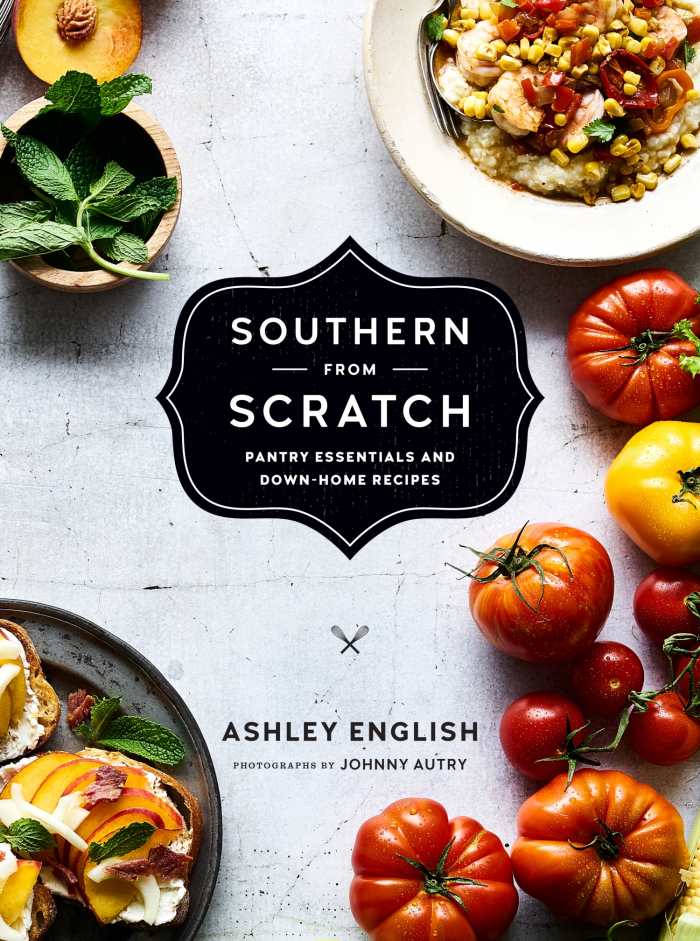
Ashley English
Johnny Autry, photographer
Roost Books
Hardcover $35.00 (256pp)
978-1-61180-331-0
Buy: Local Bookstore (Bookshop), Amazon
Drawing from her Appalachian roots and degrees in nutrition, Ashley English’s Southern from Scratch shows how to stock your kitchen with whole-food goodness, from sweet treats in the freezer to sparkling jars of home-canned pickles.
Once an advocate of a low-fat, vegetarian diet, English evolved a seasonal, slow-foods approach that includes meat but eschews processed products, just like her Nanny and Mamaw did.
Accented with atmospheric color photographs, the cookbook lays out fifty base recipes for preserves, homemade apple cider vinegar, dairy products, and plenty of tempting desserts that rely on natural sweeteners for “a kiss of sweetness, instead of a smack upside the head.” Traditional Southern ingredients are highlighted, as are uncomplicated instructions for traditional food preservation techniques like hot-water-bath canning and lard rendering.
Recipes are prefaced with homey, often humorous introductions that recall family lore, Southern culinary history, or treasured kitchen memories. English has a light, down-to-earth writing style that makes the idea of whipping up a batch of pies or home-curing a side of bacon seem like a snap. Several ideas for using recipes are included, so after those jars of Pickled Okra are cooled you can chop them into salads, crown Pecan Coins slathered in Pimento Cheese with them for a quick canape, or use them as stirrers for Spicy Bloody Marys.
Many recipes are whole-food improvements of Southern icons like hush puppies and sonkers, a North Carolina fruit-cobbler cousin. English’s recipe for ambrosia is a particularly welcome reiteration of this usually cloying dessert, utilizing a combination of fresh fruit chunks, homemade sour cream, lemon verbena, and coconut. Others recipes show off her creativity, as in Brussels Sprouts Salad enrobed in Apple Butter Vinaigrette.
This volume is an inspiring resource for homesteaders, but even urbanites will like the ideas for putting up seasonal abundance, Southern style. This book is full of tempting foods that will have you reaching for your wooden spoon, cast-iron skillet, and claw hammer (for knocking together another pantry) all at once.
RACHEL JAGARESKI (April 19, 2018)
Rubik
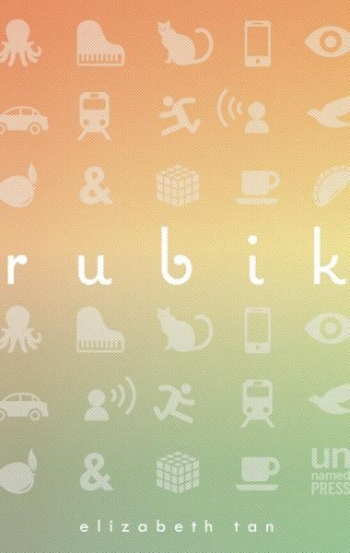
Elizabeth Tan
The Unnamed Press
Softcover $16.99 (256pp)
978-1-944700-57-7
Buy: Local Bookstore (Bookshop), Amazon
Rubik is a novel of ghosts—those of memory, technology, relationships, emotion, and bodies—all of them permanently impermanent. Released into these terrains, characters disappear and reappear in strange ways or not at all, the revelation of their journeys “so doubtful … It is almost heartbreaking that it all works.” Haunting, eerie, engrossing, and completely unexpected, Elizabeth Tan’s Rubik is a true original that will shock and surprise.
Rubik begins with the death of Elena Rubik. The novel is an afterlife to her brief presence, a Rube Goldberg machine where “the starting marble will not travel to the very end of the machine; instead it will set off other marbles on meticulously planned journeys.” Spiraling out from this initial impetuous, a series of protagonists drift through the background and foreground of each others’ lives, rarely suspecting their interconnectedness.
In a bravura display of modernity’s paradoxes, Rubik’s “Reality and dreams are in the end both stories that we tell ourselves. They are two keys that turn the same lock.” Seemingly distinct categories bleed together—fact and fiction, reality and fantasy, creator and created, individual and collective—as experience is co-constructed and almost pathologically diffuse.
Haunted by a hermeneutic of suspicion, Tan’s interconnections are engineered to the smallest detail. Within this elaborate plot, the narrative world sprawls. Yet, there’s a tension, a kind of expansive shrinking, the macro becoming micro as human scale is entered and lost. The freedom and curse of that loss is the constant threat of disconnection and the endless possibility of reinvention.
Traversing and conflating the various worlds—from anime to advertising, private schools to message boards, art galleries to industry—Rubik turns the dictum that “Content dictates form; form dictates content” into a paradox of epistemological proportions. Anxieties about impermanence and obsolescence play out across the panoply of humans and human creations, and the resulting ruptures break containers and content alike.
LETITIA MONTGOMERY-RODGERS (April 19, 2018)
Algeria is Beautiful Like America
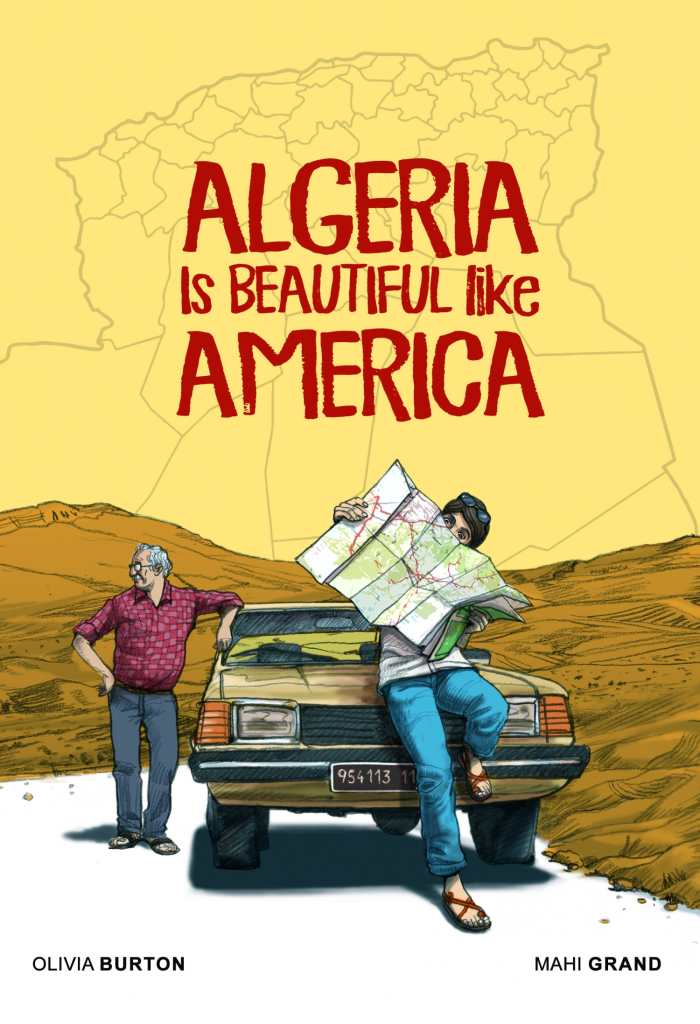
Olivia Burton
Mahi Grand, illustrator
Edward Gauvin, translator
Lion Forge
Hardcover $24.99 (176pp)
978-1-941302-56-9
Buy: Amazon
In her graphic novel memoir Algeria is Beautiful Like America, Olivia Burton travels to her family’s former homeland, only to find that many of her beliefs about her family’s past, and Algeria as a whole, are wrong.
Burton begins by establishing the reason for her curiosity about Algeria: many relatives, including her mother and grandmother, spent years relating stories of their life in that country. After years of postponing her trip because of safety concerns, Burton finally decides to go. She slowly realizes that many of her family’s stories have been idealized through the lens of time or skewed by a particular point of view.
Guided by locals and her deceased grandmother’s written memories of Algeria, Burton sifts through the bloody and sometimes confusing history of French colonists like her family and their relationship with the Arab natives who sought independence and gained it in 1962.
Translated from French by Edward Gauvin, the book doesn’t get bogged down in politics, but rather focuses on the people and personalities behind them. Mahi Grand’s artwork is perfect for this sort of travelogue, with map elements to put the geography in context and detailed representations of faces and places.
The art is black and white, with the exception of Burton’s own photographs as replicated by Grand; these are rendered in color, and they give a sense not just of the landscapes depicted, but of their impact on Burton. Algeria is Beautiful Like America is an illuminating glimpse into a mysterious country, its history, and its inhabitants.
PETER DABBENE (April 19, 2018)
Hannah Hohman
